
-
 Germany suspends arms exports to Israel for use in Gaza
Germany suspends arms exports to Israel for use in Gaza
-
Stocks waver, gold futures hit record on US tariff updates

-
 Guessand says he jumped at chance to join Aston Villa after sealing move
Guessand says he jumped at chance to join Aston Villa after sealing move
-
Israel to 'take control' of Gaza City, sparking wave of criticism

-
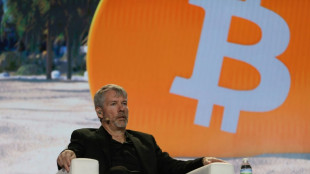 Accumulating bitcoin a risky digital rush by companies?
Accumulating bitcoin a risky digital rush by companies?
-
Liverpool's Slot hints at fresh Isak bid despite 'attacking power'

-
 PSG to sign Lille goalkeeper Lucas Chevalier: source
PSG to sign Lille goalkeeper Lucas Chevalier: source
-
Oil industry presence surges at UN plastic talks: NGOs
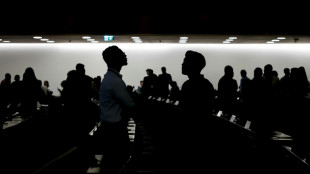
-
 Kipyegon says a woman will run a sub-four minute mile
Kipyegon says a woman will run a sub-four minute mile
-
Tokyo soars on trade deal relief as most Asian markets limp into weekend

-
 Israel to 'take control' of Gaza City after approving new war plan
Israel to 'take control' of Gaza City after approving new war plan
-
Australian A-League side Western United stripped of licence

-
 'Back home': family who fled front buried after Kyiv strike
'Back home': family who fled front buried after Kyiv strike
-
Indonesia cracks down on pirate protest flag

-
 Israeli army will 'take control' of Gaza City: PM's office
Israeli army will 'take control' of Gaza City: PM's office
-
Australian mushroom murderer accused of poisoning husband

-
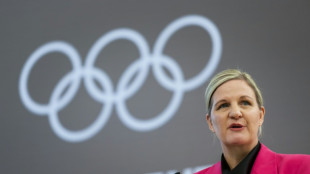 Coventry's mettle tested by Russian Olympic debate, say former IOC figures
Coventry's mettle tested by Russian Olympic debate, say former IOC figures
-
Library user borrows rare Chinese artwork, returns fakes: US officials

-
 Parisians hot under the collar over A/C in apartments
Parisians hot under the collar over A/C in apartments
-
Crypto group reportedly says it planned sex toy tosses at WNBA games

-
 American Shelton tops Khachanov to win first ATP Masters title in Toronto
American Shelton tops Khachanov to win first ATP Masters title in Toronto
-
Tokyo soars on trade deal relief as Asian markets limp into weekend

-
 New species teem in Cambodia's threatened karst
New species teem in Cambodia's threatened karst
-
Australian mushroom murderer accused of poisoning husband: police

-
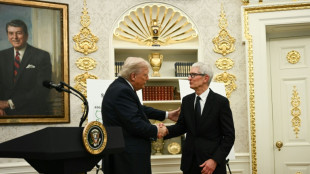 Solid gold, royal missives and Nobel noms: how to win Trump over
Solid gold, royal missives and Nobel noms: how to win Trump over
-
Canadian teen Mboko outlasts Osaka to win WTA Montreal crown

-
 Trump to host Armenia, Azerbaijan for historic 'Peace Signing'
Trump to host Armenia, Azerbaijan for historic 'Peace Signing'
-
Israeli airline's Paris offices daubed with red paint, slogans

-
 US raises bounty on Venezuela's Maduro to $50 mn
US raises bounty on Venezuela's Maduro to $50 mn
-
Lebanon cabinet meets again on Hezbollah disarmament

-
 France's huge wildfire will burn for days: authorities
France's huge wildfire will burn for days: authorities
-
Bolivia right-wing presidential hopeful vows 'radical change'
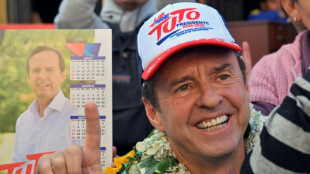
-
 Trump says would meet Putin without Zelensky sit-down
Trump says would meet Putin without Zelensky sit-down
-
Trump offers data to justify firing of labor stats chief
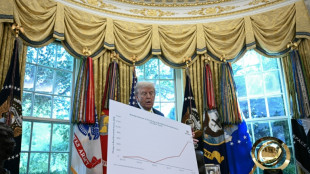
-
 Bhatia leads by one at PGA St. Jude, Scheffler five adrift
Bhatia leads by one at PGA St. Jude, Scheffler five adrift
-
Disney settles Trump-supporting 'Star Wars' actor lawsuit

-
 Trump moves to kill $7 billion in solar panel grants
Trump moves to kill $7 billion in solar panel grants
-
Venus Williams falls at first hurdle in Cincinnati

-
 Mixed day for global stocks as latest Trump levies take effect
Mixed day for global stocks as latest Trump levies take effect
-
SpaceX agrees to take Italian experiments to Mars

-
 US judge orders temporary halt to new 'Alligator Alcatraz' construction
US judge orders temporary halt to new 'Alligator Alcatraz' construction
-
US uses war rhetoric, Superman to recruit for migrant crackdown

-
 US to rewrite its past national climate reports
US to rewrite its past national climate reports
-
U can't pay this: MC Hammer sued over delinquent car loan

-
 WHO says nearly 100,000 struck with cholera in Sudan
WHO says nearly 100,000 struck with cholera in Sudan
-
Huge wildfire in southern France now under control

-
 Kane scores as Bayern thump Spurs in pre-season friendly
Kane scores as Bayern thump Spurs in pre-season friendly
-
France strikes down return of banned bee-killing pesticide

-
 Canada sends troops to eastern province as fire damage grows
Canada sends troops to eastern province as fire damage grows
-
OpenAI releases ChatGPT-5 as AI race accelerates

| RBGPF | -5.79% | 71.84 | $ | |
| CMSC | 0.04% | 22.96 | $ | |
| SCU | 0% | 12.72 | $ | |
| NGG | -0.31% | 72.08 | $ | |
| RYCEF | -0.42% | 14.44 | $ | |
| BTI | 0.51% | 56.69 | $ | |
| SCS | 0.06% | 16 | $ | |
| RIO | 1.12% | 60.77 | $ | |
| BCC | 0.32% | 83.19 | $ | |
| GSK | 2.21% | 37.58 | $ | |
| BCE | 2.23% | 23.78 | $ | |
| RELX | 1.03% | 49.32 | $ | |
| VOD | -0.36% | 11.26 | $ | |
| CMSD | -0.09% | 23.52 | $ | |
| JRI | 0.52% | 13.41 | $ | |
| AZN | 1.3% | 74.57 | $ | |
| BP | 0.91% | 34.19 | $ |

Germany's Merz faces new vote for chancellor after surprise loss
Germany's conservative leader Friedrich Merz will face a second vote in parliament on Tuesday in his bid to become chancellor after he lost the first round in a stunning early setback.
Even if he succeeds in becoming post-war Germany's 10th chancellor, the initial shock defeat dealt a heavy blow to Merz, who has vowed to restore stability in Berlin after half a year of political turmoil.
Merz, 69, whose CDU/CSU alliance won elections in February, has agreed on a coalition government with the centre-left Social Democrats (SPD) of outgoing Chancellor Olaf Scholz.
But the secret vote in the lower house, which was expected to be a formality, turned to disaster for Merz when he failed to muster the required absolute majority in the 630-member chamber, falling short by six votes.
The result signalled rumblings of dissent within the "grand coalition" of Germany's two big-tent parties, which have been forced into an uneasy governing alliance.
The early setback for Merz -- a first in German post-war history -- stunned Germany and its European neighbours and set off frantic crisis meetings in the Bundestag.
Hours later, CDU parliamentary leader Jens Spahn said all parties except the far-right AfD had decided "to proceed with a second round today at 3:15 pm (1315 GMT)".
Merz has vowed to revive the ailing economy and strengthen Berlin's role in Europe as it responds to rapid change since US President Donald Trump returned to power.
Trump has heaped pressure on European allies, complaining they spend too little on NATO and imposing tariffs that are especially painful to export power Germany.
Spahn emphasised the urgency of a new government taking office, given the economic and geopolitical turbulence.
"The whole of Europe, perhaps even the whole world, is watching this second round of voting," Spahn said, urging MPs to "be aware of this special responsibility".
- 'Unprecedented failure' -
Merz, who boasts a strong business background but has never held a government leadership post, said on Monday: "We live in times of profound change, of profound upheaval... and of great uncertainty.
"And that is why we know that it is our historic obligation to lead this coalition to success," he said.
To take over as chancellor, Merz needs an absolute majority of 316 votes in the secret ballot.
But in Tuesday's first vote, he only won the backing of 310 MPs, with 307 voting against him. Three lawmakers abstained, nine were absent and there was one invalid ballot paper.
According to the constitution, a second round of voting has to take place within 14 days.
If that fails, then a third phase would take place in which a simple majority of lawmakers -- with yes votes outnumbering no votes -- would suffice to see Merz elected.
"Merz will most likely still be elected as chancellor in the end," wrote analyst Holger Schmieding of Berenberg Bank.
"But even so, the unprecedented failure to be elected in the first round would still be a bad start for him. It shows that he cannot fully rely on his two coalition parties.
"That will sow some doubts about his ability to fully pursue his agenda, damaging his domestic and international authority at least initially."
Capital Economics analyst Franziska Palmas also argued Merz's setback "will probably not prevent him and the Grand Coalition from taking power in the coming days or weeks.
"However, it does leave Merz severely weakened and suggests that hopes for more stability in German politics may be disappointed and that the government may struggle to push through its economic policy agenda."
- Jubilant far right -
The far-right Alternative for Germany (AfD) -- the largest opposition party, which scored a record result of over 20 percent in the election -- cheered the surprise defeat for Merz.
"Merz should step aside and the way should be cleared for a general election," said AfD co-leader Alice Weidel, calling the first-round result a "good day for Germany".
The result, if confirmed, would keep Scholz in the post of caretaker chancellor for now.
It upended the political calendar in Berlin.
President Frank-Walter Steinmeier had been due to swear in the new cabinet in the afternoon, and Merz has planned visits to Paris and Warsaw on Wednesday.
O.Farraj--SF-PST
